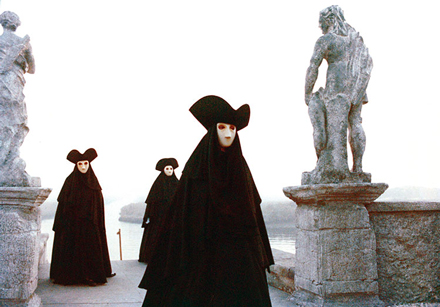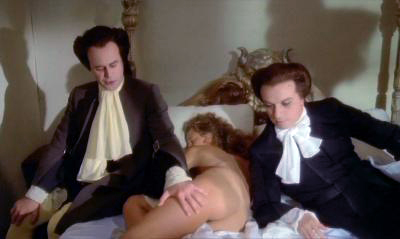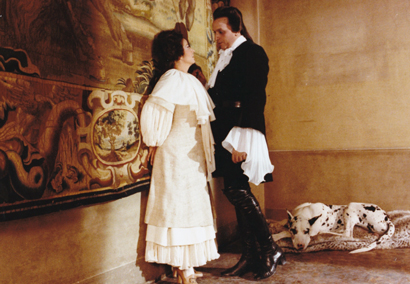
 |
|
|
|
Someone at Olive Films must have an ear and eye for opera, for the company has followed up its excellent Blu-ray of Francesco Rosi's Carmen (1984) with Joseph Losey's lavish 1979 version of Mozart's Don Giovanni. Dating back to the 18th century, the musical account of the ruthless womanizer has remained the pinnacle of the classic Opera; Losey's take abandons the glories of stage-bound effects for equally glorious Italian locations. 
Filmed opera was never exactly a weekly movie staple, as the talent was expensive and the technical and artistic requirements unusually demanding. Hardcore opera fans weren't always movie fans, either. Yet a few productions have broken through the barrier to achieve fame, most notably Ingmar Bergman's The Magic Flute. 1 Joseph Losey is more famous for a movie directing career that encompassed a few film noir masterpieces, blacklisting and exile to Europe, and finally a celebrated string of imposing 'art cinema' successes. But Losey also had his roots on the stage. His first major success was with Bertolt Brecht's play Galileo, produced in Los Angeles in 1947 and starring Charles Laughton. The highly political work was an undisguised statement about the suppression of individual thought by the state. Unlike other interpretations, Mozart's Don Giovanni casts the 'great lover' Don Juan as a predatory menace who ultimately reaps a fantastic comeuppance. Considered one of the richest classic operas, it creates a sense of drama and emotional grandeur rarely attained in other forms of entertainment. And for the casual fan of the movie Amadeus, Don Giovanni is perhaps a good starting point for appreciating the genius of Mozart. Serial seducer Don Giovanni (Ruggero Raimondi, baritone) tries to seduce the beautiful Donna Anna (Edda Moser, soprano) but ends up killing her proud father Il Commendatore (John Macurdy, bass). Giovanni comes upon an old conquest, Donna Elvira (Kiri Te Kanawa, soprano) and then tries to seduce a woman at her own wedding, Zerlina (Teresa Berganza, mezzo-soprano). Giovanni continues his seductions, including Elvira's personal maid, but is forced to take special precautions when Donna Anna and her fiancé Don Ottavio (Kenneth Riegel, tenor) come looking for justice for her father's murder. Giovanni switches identities with Leporello, his servant (José van Dam, bass-baritone), which produces more complications. Thinking they've evaded their pursuers, Don Giovanni and Leporello relax in a cemetery ... a very unwise move. Sung in Italian by a cast of top stars, Don Giovanni will fascinate opera fans and also provoke a few discussions. Ruggero Raimondi's imposing seducer hero has a marked cruelty in his facial features. His rapacious habits have little to do with love; his life's work is running up a record number of victim-conquests. The women in his life are bracketed by two great ladies, a prior victim who knows the score, and Donna Anna, the one that got away. Breaking the rules of society and the general morality, judgment for Don Giovanni comes in a fantastic form, as in a horror tale. 
Losey's stage-to-screen adaptation has what it takes to do Mozart justice. The production is about as attractive as one can imagine. England's Gerry Fisher (Accident, Mr. Klein) creates striking images both on location and in studio settings. What we see looks like Venice but is actually a city called Vincenza, and an impressive site called Villa Rotunda a standout. Novices won't feel left out; one of the first images is of a group arriving by boat at a Bal Masque, with people wearing white masks identical to the ones familiar from Milos Forman's Amadeus made several years later. The production designer/art director is Alexandre Trauner, whose incredible career included French poetic realist masterpieces, Children of Paradise, epic spectaculars, French crime classics and great pictures by John Huston and Billy Wilder. Don Giovanni surprises us with an interesting style that links formal opera to the more realistic locations. Losey reportedly claimed to never have seen a stage production of Don Giovanni, which perhaps accounts for his free adaptation of the book. That's a common claim by directors who would rather not speak of their work in a wider context, or admit that their interpretation was influenced by previous works. Even a casual opera enthusiast may notice an interesting character that Losey has invented on his own. Don Giovanni is now almost constantly shadowed by a young, silent Valet in Black (played by Eric Adjani). Always observing his master and mostly unacknowledged, the Valet has been interpreted as Giovanni's conscience, or perhaps an innocent version of himself, a dopp&elgänger Mini-Me. Opera fans are bound to be fascinated by the production even as they complain that, by particularizing the story in a set location, Losey has limited the enthusiast's freedom to fill in his own details. This isn't much different than when Hollywood 'opens up' a little New York stage show with giant vistas and scenery... things change. But the whole point in opera (I am assured) is that the audience member loses himself in the music, as in a concert, forming their own mental pictures to go with the singing voices. Losey's specific physical production changes the equation. Losey hasn't trivialized the music (as some critics howl about Disney's Fantasia), but the film form cannot help but make concrete emotional images that on stage remain highly personal. Some reviews of Don Giovanni have criticized som the audio as being too boomy or echo-y, which points to another added Losey wrinkle. On stage the star singing voices are always front and center. If two people are supposed to be distant from one another as they sing, stage convention allows for it. Losey is fond of placing singers at an appropriate distance from one another, sometimes dozens of yards, and perspectivizing their voices in a realistic manner. Technically correct as this may be, it undercuts some of the singing. Opera fans are possessive about every lyric line and are going to take note when some pieces of songs are heard as if from half a block away. 
Losey fans may also note that the director's social sentiments come through in a few social details. Don Giovanni moves exclusively in aristocratic circles, except when a pretty face is involved. The rich are definitely presented as the masters. Servants are everywhere but they really have no place in the action. This is of course a given in any show of this kind, but Losey points up the oppressive nature of the social structure through little details. We're often aware that the footmen and personal servants are being treated like non-entities, like furniture. Just as he did back in his Hollywood artistic-radical days, Losey insists on criticizing the status quo. Olive Films' Blu-ray of Don Giovanni will thrill fans that up until now hadn't a hope of finding a quality home video version of this show. I believe that this is the first Joseph Losey film to merit a Blu-ray release, and I don't see any stampeding demand for his pictures, not even his celebrated 1960s collaborations with Harold Pinter and Dirk Bogarde, that once were listed as some of the best films being made anywhere. Olive has accessed excellent elements and the color and sound are exemplary; the disc probably looks better than 35mm art house prints from 1979. And at almost three hours long, it will surely be a more comfortable experience than in a revival theater. On the other hand, although the audio appears to have been pre-recorded, with the talent acting to playback, the lip-synch is excellent and never an issue.
On a scale of Excellent, Good, Fair, and Poor,
Don Giovanni Blu-ray rates:
Footnote:
1. Italian producers, naturally, have been especially committed to this subgenre. The closest I ever got to a 1950s Italo version of Aida was a trailer, which shows it to be an expensive-looking Technicolor production... with Sophia Loren in a small role.
Reviews on the Savant main site have additional credits information and are often updated and annotated with footnotes, reader input and graphics.
Review Staff | About DVD Talk | Newsletter Subscribe | Join DVD Talk Forum |
| ||||||||||||||||||